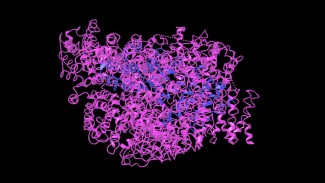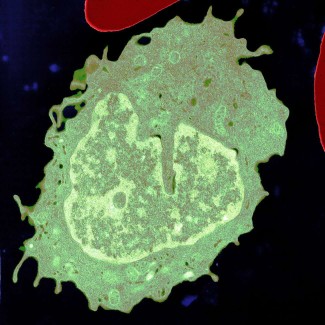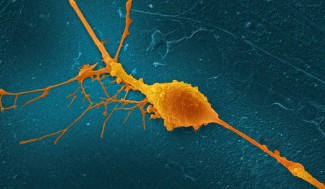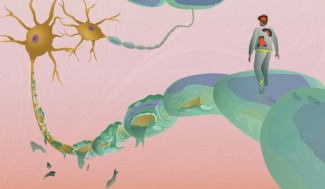Discover the SMARTinMS project, which explores the role of inflammation in multiple sclerosis while working to better understand the mechanisms of the disease and opening the door to new therapeutic approaches.
What is plaque sclerosis?
Multiple sclerosis is a demyelinating disease of the central nervous system.
Myelin: a crucial role
Myelin plays a crucial role in the functioning of the brain and spinal cord. It acts as a protective sheath around neurons, accelerating the conduction of nerve signals. Without myelin, the transmission of these signals becomes slow and inefficient, disrupting communication between the brain and the rest of the body. As a result, people with multiple sclerosis suffer from motor symptoms, such as difficulties with movement, but also cognitive and sensory symptoms.
An autoimmune disease
Multiple sclerosis is an autoimmune disease, which means that the body's cells are mistakenly attacked by the immune system, which is normally responsible for defending the body against infection. In MS, the immune cells in the brain, called microglial cells, destroy myelin. This inflammatory process damages neurons and results in progressive impairment of their functions.
Symptoms of Multiple Sclerosis
The symptoms of multiple sclerosis vary considerably from person to person, depending on the areas of the brain and spinal cord that are affected. Symptoms are primarily motor, but may also include sensory, visual, cognitive and emotional problems.
Motor Symptoms
Motor symptoms of multiple sclerosis are the most common. They include slowness of movement, muscle rigidity, tremors and difficulty walking. Depending on the location of lesions in the nervous system, patients may also experience problems with balance and coordination.
Non-motor symptoms
In addition to motor symptoms, multiple sclerosis also causes non-motor symptoms, such as cognitive impairment (difficulty concentrating, impaired memory), mood disorders (such as depression) and visual disturbances. These non-motor symptoms are often underestimated, but can have a significant impact on patients' quality of life.
Treatment Prospects for Multiple Sclerosis
Today, there is no cure for multiple sclerosis, but treatments can help manage symptoms and slow the progression of the disease. Current treatments focus on modulating the immune system to limit inflammation and prevent the destruction of myelin.
The SMARTinMS project
Remyelination is a key process in the treatment of multiple sclerosis as it repairs damaged myelin. However, this process is often ineffective in advanced forms of the disease.
Research conducted by the Brain Institute as part of the SMARTinMS project has identified the conditions conducive to remyelination, but also the factors that prevent this repair. These findings pave the way for new therapeutic strategies to stimulate remyelination and slow the progression of the disease.
Influence of Lymphocytes in Microglial Cell Activation
One of the major challenges in multiple sclerosis is the lack of capacity of the central nervous system to repair damage caused by loss of myelin. Although some cells, such as oligodendroglials, have the ability to repair myelin, this repair is often insufficient, especially in progressive forms of the disease.
The SMARTinMS project highlighted the importance of other immune cells, lymphocytes, in activating the microglial cells responsible for myelin degradation.
After transplanting lymphocytes from sick and healthy people into the spinal cord of mice in which myelin was destroyed, scientists came to 2 conclusions: lymphocytes from multiple sclerosis patients cause persistent activation of microglial cells, leading to chronic inflammation and preventing myelin repair. In contrast, when lymphocytes from healthy people are grafted into a mouse model, remyelination occurs spontaneously, indicating that this activation is a major factor in disease progression.
Towards new avenues of treatment
Through the SMARTinMS project, scientists at the Brain Institute have developed an experimental model of multiple sclerosis, a valuable tool to better understand the cellular mechanisms that lead to the death of neurons in progressive forms of the disease. The project also makes it possible to identify new avenues for treating the disease.
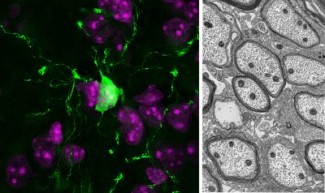
La Sclérose en Plaques (SEP)
La Sclérose en Plaques (SEP) est la 2ième cause nationale de handicap acquis chez l’adulte jeune après les traumatismes. Elle touche aujourd’hui 120 000 personnes en France avec 3 000 nouveaux cas diagnostiqués chaque année. Cette maladie constitue...
Read more



